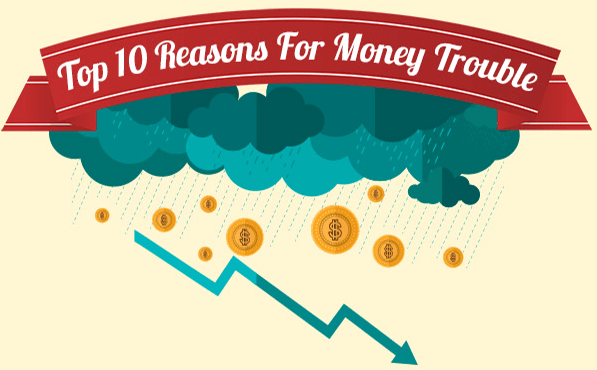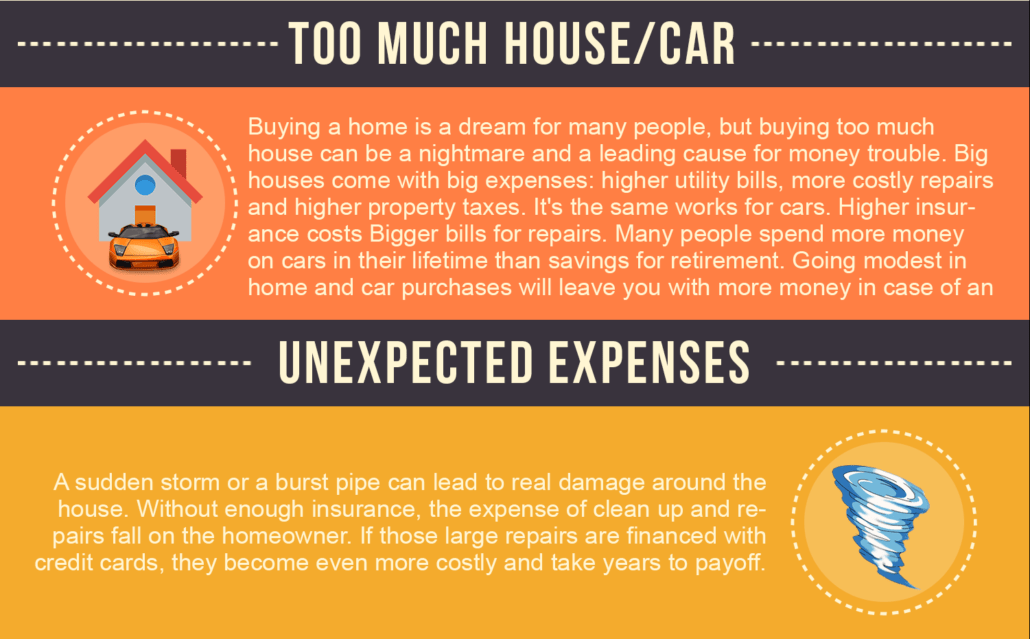10. Too Much House/Car
Buying a home is a dream for many people, but buying too much house can be a nightmare and a leading cause for money trouble. Big houses come with big expenses: higher utility bills, more costly repairs and higher property taxes.
It’s the same works for cars. Higher insurance costs Bigger bills for repairs. Many people spend more money on cars in their lifetime than savings for retirement. Going modest in home and car purchases will leave you with more money in case of an emergency.
9. Unexpected Expenses
A sudden storm or a burst pipe can lead to real damage around the house. Without enough insurance, the expense of clean up and repairs fall on the homeowner. If those large repairs are financed with credit cards, they become even more costly and can take years to payoff.
8. Gambling Problems
Many adults drink and drink safely, but those who have a problem managing these behaviors can quickly find themselves facing serious money trouble. Addictive behaviors are often associated with
- Increased absenteeism and job loss
- Higher rates of depression, anxiety and suicide
- Greater rates of marital and family breakdown
- Significant financial loss
7. Too Little In Savings
Prepare for the unexpected by saving a little out of each paycheck. This is the best way to bridge jobless, unexpected expenses and medical debts. Having three to six months of savings will give you the time to find long term solutions most financial challenges.
6. Failing Business
Failing businesses are a frequent cause of money trouble. This is especially so when business debts are personally backed by the owner. One solution is to incorporate the business and only provide money as a documented loan to the business. This separates business and business funds and helps to protect personal assets.
5. Student Loan Debt
Between 2004 and 2014, undergraduate tuition, fees, room, and board at public schools rose 34 percent, and 25 percent at private nonprofit schools. Personal Income has not kept up. Many parents juggle loans to send their children to college. Recent graduates, already struggling to find high paying jobs, are saddled with more debt. Education is key to getting a good, but excessive student and personal loans mean less room in household budgets.
4. Medical expenses
Lapsed policies, skyrocketing health care cost and growth of high deductible plans all contribute to increasing debt and health care costs. This is a difficult area to manage because you don’t decide to get sick. But if you can, try to avoid charging medical cost. Ask your doctor for discounts and hospitals for payment plans and financial assistance.
3. Poor money management
If you don’t know where your money is going, you are going to end up in trouble. You may be wasting hundreds of dollars every month and are left turning to credit to make ends meet. Long term is can lead to financial ruin. A simple spending plan, writing down expenses & income and reconciling the two, is essential.
2. Divorce
Divorce and separation are expensive, both emotionally and financially. The list is staggering: child support & alimony, the division of family assets, and the loss of income can be devastating to all parties.
1. Lowered Income/Steady Expenses
This is the big one. When income is cut, often we take too long to reduce expenses. Perhaps they hope that we’ll find more income and we fill the gap with debt. The more quickly to reduce expenses, the better off you’ll be financially. As soon as you or your spouse experiences job loss, immediately call your creditors and ask for a help.


